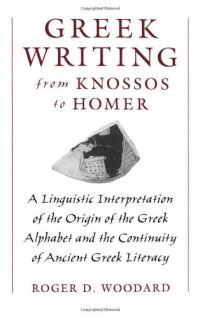
Ebook: Greek Writing from Knossos to Homer: A Linguistic Interpretation of the Origin of the Greek Alphabet and the Continuity of Ancient Greek Literacy
Author: Roger D. Woodard
- Genre: Linguistics // Foreign
- Tags: Языки и языкознание, Древнегреческий язык
- Year: 1997
- Language: English
- pdf
Greek Writing from Knossos to Homer examines the origin of the Greek alphabet. Departing from previous accounts, Roger Woodard places the advent of the alphabet within an unbroken continuum of Greek literacy beginning in the Mycenean era. He argues that the creators of the Greek alphabet, who adapted the Phoenician consonantal script, were scribes accustomed to writing Greek with the syllabic script of Cyprus. Certain characteristic features of the Cypriot script--for example, its strategy for representing consonant sequences and elements of Cypriot Greek phonology--were transferred to the new alphabetic script. Proposing a Cypriot origin of the alphabet at the hands of previously literate adapters brings clarity to various problems of the alphabet, such as the Greek use of the Phoenician sibilant letters. The alphabet, rejected by the post- Bronze Age "Mycenaean" culture of Cyprus, was exported west to the Aegean, where it gained a foothold among a then illiterate Greek people emerging from the Dark Age.
Download the book Greek Writing from Knossos to Homer: A Linguistic Interpretation of the Origin of the Greek Alphabet and the Continuity of Ancient Greek Literacy for free or read online
Continue reading on any device:

Last viewed books
Related books
{related-news}
Comments (0)